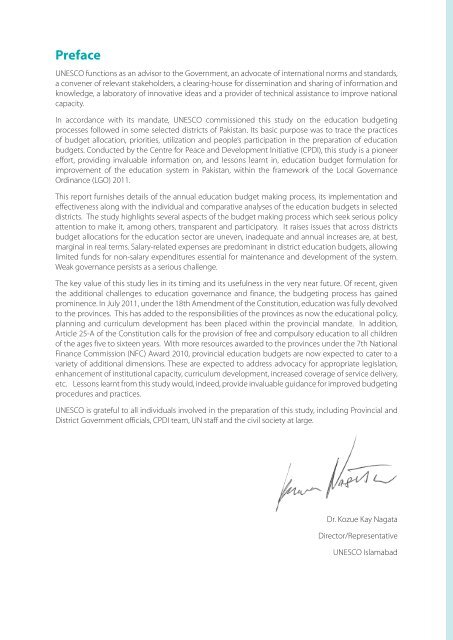Education Budgets - UNESCO Islamabad
Education Budgets - UNESCO Islamabad
Education Budgets - UNESCO Islamabad
Create successful ePaper yourself
Turn your PDF publications into a flip-book with our unique Google optimized e-Paper software.
Preface<br />
<strong>UNESCO</strong> functions as an advisor to the Government, an advocate of international norms and standards,<br />
a convener of relevant stakeholders, a clearing-house for dissemination and sharing of information and<br />
knowledge, a laboratory of innovative ideas and a provider of technical assistance to improve national<br />
capacity.<br />
In accordance with its mandate, <strong>UNESCO</strong> commissioned this study on the education budgeting<br />
processes followed in some selected districts of Pakistan. Its basic purpose was to trace the practices<br />
of budget allocation, priorities, utilization and people’s participation in the preparation of education<br />
budgets. Conducted by the Centre for Peace and Development Initiative (CPDI), this study is a pioneer<br />
effort, providing invaluable information on, and lessons learnt in, education budget formulation for<br />
improvement of the education system in Pakistan, within the framework of the Local Governance<br />
Ordinance (LGO) 2011.<br />
This report furnishes details of the annual education budget making process, its implementation and<br />
effectiveness along with the individual and comparative analyses of the education budgets in selected<br />
districts. The study highlights several aspects of the budget making process which seek serious policy<br />
attention to make it, among others, transparent and participatory. It raises issues that across districts<br />
budget allocations for the education sector are uneven, inadequate and annual increases are, at best,<br />
marginal in real terms. Salary-related expenses are predominant in district education budgets, allowing<br />
limited funds for non-salary expenditures essential for maintenance and development of the system.<br />
Weak governance persists as a serious challenge.<br />
The key value of this study lies in its timing and its usefulness in the very near future. Of recent, given<br />
the additional challenges to education governance and finance, the budgeting process has gained<br />
prominence. In July 2011, under the 18th Amendment of the Constitution, education was fully devolved<br />
to the provinces. This has added to the responsibilities of the provinces as now the educational policy,<br />
planning and curriculum development has been placed within the provincial mandate. In addition,<br />
Article 25-A of the Constitution calls for the provision of free and compulsory education to all children<br />
of the ages five to sixteen years. With more resources awarded to the provinces under the 7th National<br />
Finance Commission (NFC) Award 2010, provincial education budgets are now expected to cater to a<br />
variety of additional dimensions. These are expected to address advocacy for appropriate legislation,<br />
enhancement of institutional capacity, curriculum development, increased coverage of service delivery,<br />
etc. Lessons learnt from this study would, indeed, provide invaluable guidance for improved budgeting<br />
procedures and practices.<br />
<strong>UNESCO</strong> is grateful to all individuals involved in the preparation of this study, including Provincial and<br />
District Government officials, CPDI team, UN staff and the civil society at large.<br />
Dr. Kozue Kay Nagata<br />
Director/Representative<br />
<strong>UNESCO</strong> <strong>Islamabad</strong>

















